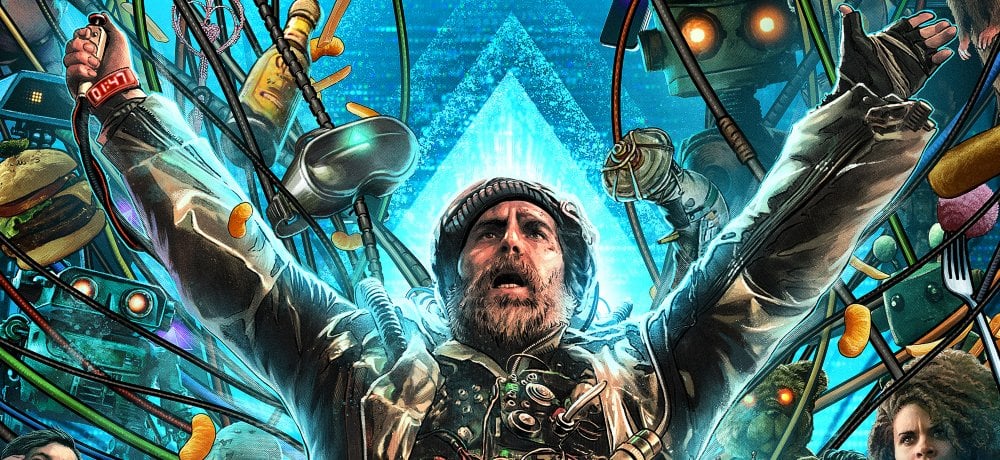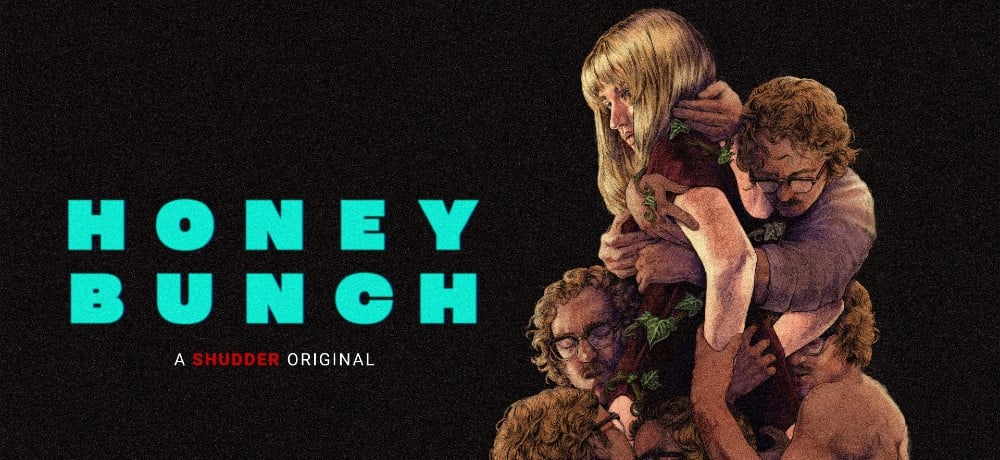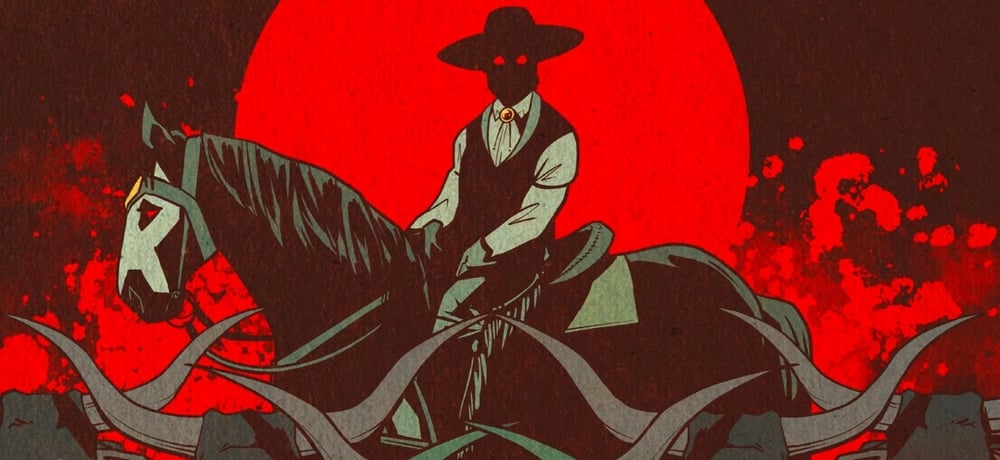





This Saturday, co-writer/director Amanda Kramer’s daring and unforgettable feature film debut, Ladyworld, is set to enjoy its world premiere at Fantastic Fest 2018. Starring Ariela Barer, Annalise Basso, Ryan Simpkins, Maya Hawke, Odessa Adlon, Tatsumi Romano, Zora Casebere, and Atheena Frizzell, Ladyworld follows a group of teenagers who get trapped inside a house after a catastrophic earthquake, unable to escape or reach the outside world, and we watch as their relationships and power hierarchies dissolve the longer they’re isolated together.
Ahead of its Fantastic Fest bow this weekend, Daily Dead caught up with Kramer to talk about her unconventional exploration of the dynamics between young women in Ladyworld, and she also chatted about putting together her brilliant ensemble of up-and-coming talent, the challenges of shooting this film in just 12 days, and how her prior experiences working in both the literary and theater worlds helped prepare her to make her first feature film.
Congratulations on Ladyworld, Amanda. This film is definitely like nothing I've seen this year, and I think that's just one of many reasons why it resonated so hard with me. I just love movies that push me a little bit and give me something different. Can you talk about your approach to building this world and these characters?
Amanda Kramer: Thank you. I want to say on that note, I think every filmmaker has an interior monologue running constantly about what they're looking to do in their career and their process. But unfortunately, or fortunately for me, mine is sort of meshed with my actual personality, and not just my professional ideology. I always want to be unique and I always want to be a standout, and when you walk around worried that your work isn't gonna stand out, or stop someone, or redirect someone, it's a weird fear that sort of creeps over, because of course the last thing I want to do is be casual. I want to be polarizing. I want to be part of something that stays with you and starts conversations. So, thank you so much, because I don't know if there is a bigger compliment that I personally could receive about the work that I do. So, I'm grateful for that.
Yeah, I worked on this idea years ago, which I think there's something interesting about the timing, because we hadn't arrived at the moment, culturally, that we've arrived at now. This was far before we were calling out perverts, but now we have a divided line, right? So, this was years ago, and all I really wanted to do was put women in a room together. I just wanted to see women acting off of each other, and I wanted to potentially get younger actresses who were usually playing daughters in bit parts, or playing classmates, or younger sisters, or people whose whole identity on screen was sort of delegated to be, I think, trite, dull, tired representatives of teenagers, and do something crazy and melodramatic and over the top, and give them the opportunity to have weird performances.
"Weird" is probably the wrong word. Maybe more like classic, sort of operatic performances that I grew up loving, like early Meryl Streep, Gena Rowlands, Isabella Adjani, and Isabelle Huppert. That's really all it started with, and as a person who loves watching actresses act, the greatest pleasure on set is just to stand by my monitor and watch these women put it all out there.
This film becomes a really profound statement about how we as women tend to tear each other down, when we really should be lifting each other up. And I love the fact that you have that with the dichotomy between the characters of Olivia and Piper in this, where Olivia represents the idealism, and Piper represents all these things in this world that'll just come through and take what they want, and destroy what they don’t like. How conscientious was that to you in the back of your mind as you were working on this project? It just feels like this dark secret we don’t see explored too often in film.
Amanda Kramer: Yeah. This is the dark secret, isn't it? When I was a kid, I grew up with The Babysitter's Club books, and my experience with those books told me that girls are all best friends, and all they ever do is lift each other up and care about each other, and keep each other's secrets and motivate each other, and be shoulders for each other to cry on. And it's propaganda, right? It's weird friendship propaganda, because I think women are supposed to be seen as, we're tender, we're fragile, we're precious. And for as much as that is true, at the same time, we're entirely manipulative, because we potentially understand each other better. Maybe I can say that. I don't like to generally give gendered responses, but I do think the idea that men are competitive is a foregone conclusion at this point, obviously. But women are tirelessly competitive, too.
And that has to do with the patriarchy. If I'm being honest, I think we've been trained to think that there's only one spot for a woman, and you want to be that woman. So, what does that mean? You have to tear other women down. And that's really unfortunate, and it is slowly changing. But I do think that a major theme of the film is feminine tedium, and what happens when women are left alone to their own spiraling mania, and what we're willing to do in order to take our claim in a small group of women, which is actually pretty perverse, and if any woman has ever experienced that, it's kind of treacherous. It's its own violence.
I think what Ariela [Barer] and Annalise [Basso] are able to provide in those two characters, though, is that sort of dimensionality I wasn't even expecting. Sometimes I watch Olivia in this, and I think that she's kind of an asshole, too. She’s not a good leader, and doesn't actually really want to help anyone, and wants to be left alone, and that feels far more selfish than I think a traditional villain role feels. And Annalise as Piper, you can see that she is actually really insecure. And if you're an older woman watching that performance, you can see it. You can see that she's desperate, and the desperation helps her, as a villain, not be so one-dimensional.
You just talked about Ariela and Annalise, but this whole cast, from top to bottom, is fantastic. Can you talk about putting together this ensemble, and just letting these girls do their thing, and really get these little moments to capture their characters in between some of the bigger moments that happen between the character conflicts?
Amanda Kramer: The motivation in the industry that I work in is to go for the biggest star and the most famous people of all time. And without just being specific, obviously, there's a short list of girls in this age range that I think are known as stars internationally, so everyone is always being geared toward that shortlist. That doesn't excite me, and it doesn't thrill me, either. What I want is to have some sort of mixture of professional levels and identities and attitudes toward work. So, I was never gonna go for these traditional casting choices. I cast without auditions. I cast solely on instinct, on conversation, on having coffee, which obviously makes me a producer's nightmare [laughs].
But the one thing I know I have that's beyond my own education is my odd director instinct. So, I could just sit across from these girls, and have a conversation with them, and understand what they would give to the role, and really think about that, and know that they would surprise me while also giving me what I wanted, which is the perfect magical combination. And that's what I'm looking for, is magic, which is a corny thing to say admittedly, but when we got these women all in a room together, it was a somewhat profound moment for me. And hopefully, for them, too.
Some of them cast each other, too. I let them dictate quite a bit on this film, and I think that's why we got what we got. And the first day that they were all together, I just knew something really crazy was gonna happen. I could sense it. I was like, "I know that the best moments of this film will be when you're all together, because I know that there will be that power in all of these bodies next to each other."
But here's the other thing about an ensemble cast of girls that are just intuitive and smart and fresh. It seems as though they studied me as often as they studied their characters, and started to understand what I wanted as a director, and would come in to see me saying, "I know what you want me to do. You want me to get on all fours." Or, "I know what you want me to do. You want me to say it like this." I mean, how exciting and how wonderful is that? The odd thing about female actresses is that they are manipulative in a wonderful way. They are sensing you, and sensing your desire. And so, in full collaboration, they would sense each other and work off of each other, and then sense me, to know what I wanted. We also shot the film in 12 days, and we were able to get every single scene at peak performance because they were all so ready and willing.
You mentioned shooting this in 12 days and on paper, it probably sounds like an easy premise, because you're using one location that’s contained. But you’re also working with a rather large ensemble, and to me, it seems like a really huge challenge because of all the moving parts to this story.
Amanda Kramer: Yeah, there was nothing easy about it. It was really challenging. Every day was very challenging. I'm a very strict filmmaker on one side of the camera, and on the other side of the camera I'm very open. But if I frame a shot or block a shot, you have tape at your feet and you can't move. And I don't know how that affects acting, but that's where we were at. Things were so highly choreographed, and so poetic, and so to the exact point, that the girls were confined and claustrophobic, so it was a huge challenge to get something that felt chaotic and yet at the same time had lots of moments of stillness and the unique growth we see in each of these characters.
We went into every scene like theater rehearsal. It was just dead silence, eight faces looking at me, me looking at eight faces, like, "Here's exactly where you go. Here's exactly where you stand." And as soon as I got there, they came into their characters quite immediately. But at the end of three takes, we either have it or we don't have it. We can go one more and then we move on. It's economical, timewise, to work under that pressure, so that means everyone has to be on their game.
My crew was like a machine, too, and they knew exactly what I wanted as well. So, I think that that's what helped it move so quickly—we were all just in awe of this cast, and we just wanted to keep them in this world. After certain scenes, everyone would break into applause, because it felt like it was live theater. No one could believe sometimes what these girls were coming up with.
You've written books, you've worked in theater, you've done shorts, and now you're making this huge leap into the feature world. How much did all of those different various experiences in your career help prepare you for this project? Because I think the variety, for me, is key, and adds something to the dynamic that you have as a storyteller.
Amanda Kramer: Exactly. For example, when you're getting your crew together and then when you're getting your cast together, everyone is expecting imagery, or they're expecting you to point to other references in order for them to understand what the look and feel of the film will be, but they're all expecting film references. So, they're expecting me to say, "Here's this movie. Watch this," or, "Here's this performance. Watch this."
Because of my background, I'm able to say, "Here's a painting. Here's a sculpture. Here's a short story." And I think if you can come at it with that sort of variety, to make something that exceeds expectations as far as just a moment in cinema, you can have a film that feels theatrical, you can have a film that feels painterly, like you’re creating living art. I believe you have to cultivate your own culture and your own artistic merit by being into all fine arts, so that you can make the fine art you make and how to get the story. That’s just how I have always worked and it's how I can continue to thrive in my work.
---------
Keep an eye on our Fantastic Fest 2018 hub to keep up to date on all of our live coverage of the festival from Austin!